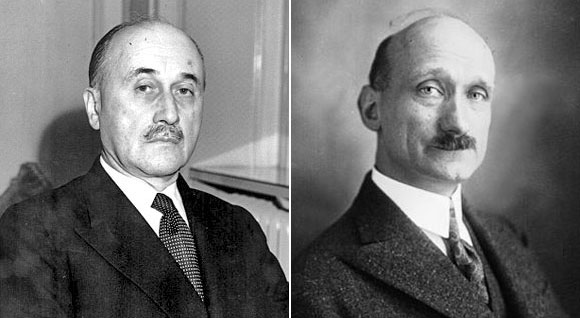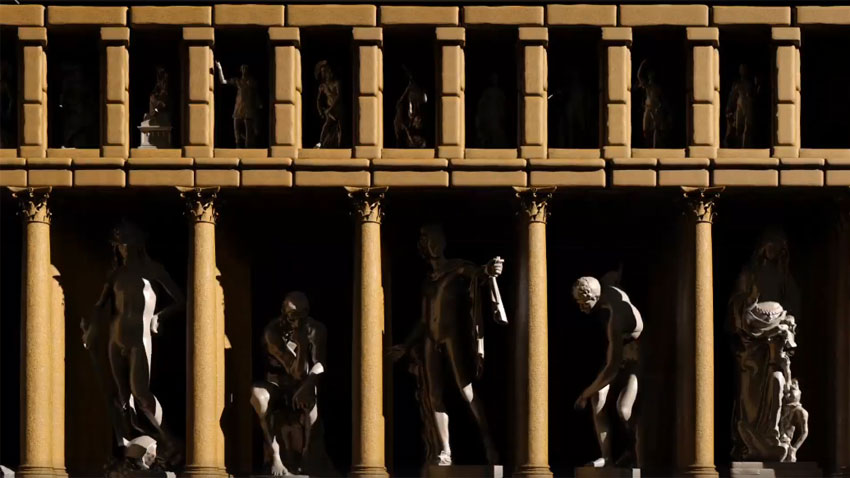 „Europe has never existed. One must genuinely create Europe,” Jean Monnet, one of the fathers of the European Union, then Commissioner of Planning of France /commissaireauPlan/,said in 1950. He was not after any abstract ideals likely to unite the continent but rather counted on economy as the motive power of integration. One of Monnet’s co-thinkers was French Foreign Minister Robert Schuman. On May 9, 1950 he presented the declaration for the creation of the European Coal and Steel Community (founded in 1951). With it a common market for those products came into force in 1952. In this way starting from economic integration the road was paved for political and spiritual unification of a new Europe based on common values. Since 1986, May 9 has been celebrated as Europe Day.
„Europe has never existed. One must genuinely create Europe,” Jean Monnet, one of the fathers of the European Union, then Commissioner of Planning of France /commissaireauPlan/,said in 1950. He was not after any abstract ideals likely to unite the continent but rather counted on economy as the motive power of integration. One of Monnet’s co-thinkers was French Foreign Minister Robert Schuman. On May 9, 1950 he presented the declaration for the creation of the European Coal and Steel Community (founded in 1951). With it a common market for those products came into force in 1952. In this way starting from economic integration the road was paved for political and spiritual unification of a new Europe based on common values. Since 1986, May 9 has been celebrated as Europe Day.
On 14 December 1995, the Bulgarian parliament voted a resolution under which the Republic of Bulgaria should submit an official application for full membership of the European Union. A long process of negotiations began. On 25 April 2005 at ceremony in Luxembourg, Bulgaria and Romania signed treaties of accession to the European Union on 1 January 2007.
Bulgaria’s accession to EU was expected with great enthusiasm across the country. Millions of viewers watched live the ceremony on 25 April 2005, as the event offered a moving national nuance – the Anthem of Europe from Beethoven’s Symphony No. 9 was performed in Bulgarian by the incredible singers from the choir Le Mystere Des Voix Bulgares. For Bulgarians the European Union was more of a social alliance working for the cause of security and prosperity in the most important spheres of life – economy, employment, standards of living, human rights, social benefits and opportunities for study.
With time enthusiasm switched to a more realistic attitude and overtones of Euroscepticism could also be heard. Most Bulgarians are aware that being part of the European Union is not a panacea; that apart from a social community the EU is also a liberal space where personal success is a priority. As a whole the support of Bulgarians for EU membership remains high – 55% and is six percentage points higher than in 2016, Eurobarometer suggests. The main priority areas where Bulgarians want to see more results on the part of the European Union include combating terrorism (61%); poverty and social inclusion (40%); and uncontrolled migration (38%). These are followed by the problems of unemployment (33%), religious radicalism (26%) and organized crime (24%). Without doubt stronger support for EU at the end of 2017 is linked to the Bulgarian Presidency of the Council of the European Union but also to the European policy of combating terrorism and uncontrolled migration.
This year is the year of the first Bulgarian Presidency of the Council of EU. The atmosphere on 9 May, Europe Day, is festive in Sofia and across the country. Tonight starting from 9:30 p. m. Sofia is hosting a 3D mapping show on the façade of the Council of Ministers. „This is an unconventional way to mark Europe Day”, commented Teodor Stoychev, head of the information office of the European Parliament in Sofia. The highlight will be the European Year of Cultural Heritage. A Literature Night is on the program in Sofia. The event is organized jointly with the cultural institutes of the EU Member States and seeks to popularize European culture. Other 11 cities will also host European Literature Nights including Plovdiv, Varna, Rousse and Veliko Tarnovo.

European celebrations are due on 12 and 13 May when the South Park in Sofia is hosting the festival Famillathlon featuring a stand of the European Commission. It is part of the French movement Famillathlonand has been organized for a tenth year running by Roditeli (Parents) Association. The event is dedicated to the family, sports and healthy lifestyles and offers a diverse program of activities for children and parents. One of them is the entertaining game The Little Europe in which every family can learn interesting facts about the European Union member countries.
English Daniela Konstantinova
One of the most ancient breeds in Europe, the Karakachan dog is the first Bulgarian indigenous breed of farm animal recognized by the Animal Breeds Commission of the Ministry of Agriculture in 2005. It owes its name to the nomadic sheep breeders known..
The tailor shop of the Pedrie and Mümin Mestan family is located on one of the busiest streets in Brussels’ Schaerbeek district. They are originally from Kardzhali but have been living abroad for more than 35 years. In the summer of 1989, they left..
The Balkan Mountain, ceramics and the plum fruit are the emblem of the Troyan region. And the locals know how to preserve their traditions. The event that marks the end of the agricultural year at the end of each September – the Bulgarian Plum Festival –..
The Bulgarian dance group “Dilmana” based in Copenhagen will celebrate 15 years since its establishment with a celebration on October 18, the formation..
A photo exhibition called “Bosilegrad Before and Now – 2” will open on October 13 at the Municipal Art Gallery in the town of Karlovo. The photo..

+359 2 9336 661
